Preparing for behavioral interviews is crucial for success, especially in competitive job markets like New York. By understanding potential questions and practicing responses, candidates can boost their confidence and performance. Coaching support offers personalized guidance and group learning, helping individuals articulate their experiences and showcase their skills effectively.
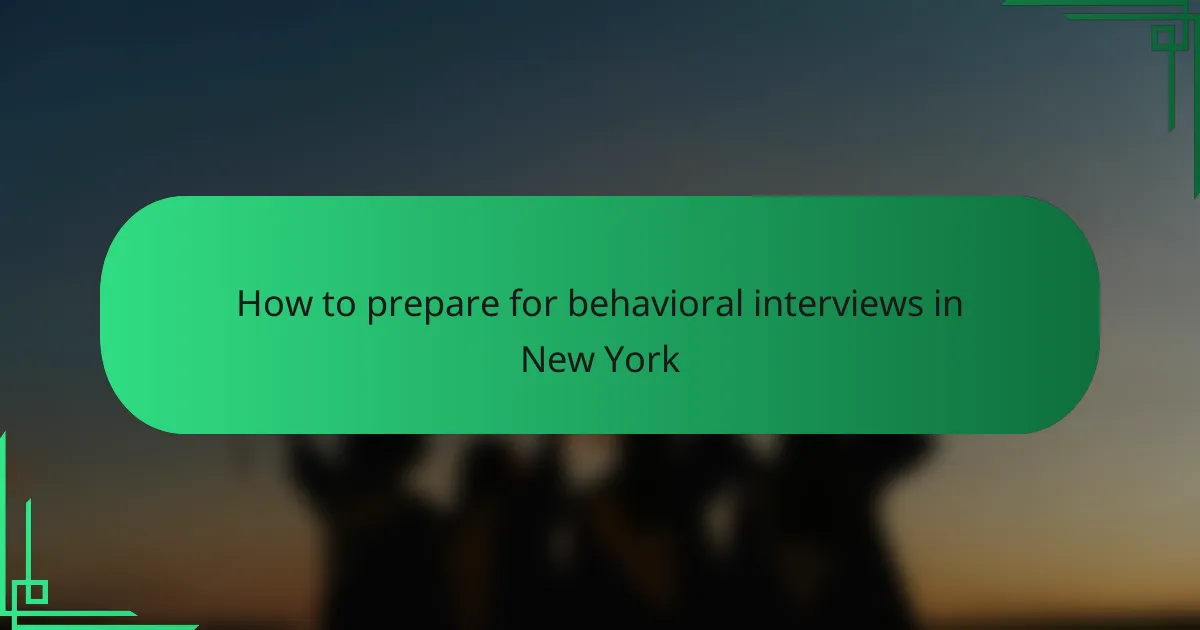
How to prepare for behavioral interviews in New York
Preparing for behavioral interviews in New York involves understanding the types of questions you may face and practicing your responses effectively. This preparation can significantly enhance your confidence and performance during the actual interview.
Research common behavioral questions
Start by familiarizing yourself with common behavioral interview questions that employers in New York typically ask. These often include inquiries about teamwork, conflict resolution, and leadership experiences. Examples include “Tell me about a time you faced a challenge at work” or “Describe a situation where you had to work with a difficult colleague.”
To streamline your preparation, compile a list of these questions and categorize them based on themes such as problem-solving, adaptability, and communication skills. This will help you structure your responses more effectively.
Practice with mock interviews
Engaging in mock interviews is a crucial step in your preparation process. Consider scheduling sessions with friends, family, or career coaches who can provide constructive feedback. Aim for at least three to five practice interviews to build your confidence and refine your answers.
During these mock sessions, focus on articulating your experiences clearly and concisely. Use the STAR method (Situation, Task, Action, Result) to frame your responses, ensuring you cover all necessary aspects of your experiences.
Utilize coaching services
Coaching services can offer tailored support for behavioral interview preparation. Look for local career coaches in New York who specialize in interview techniques and can provide personalized guidance. These professionals can help you identify your strengths and weaknesses, enhancing your overall interview strategy.
Consider investing in a few coaching sessions to refine your approach. A coach can simulate real interview scenarios and provide feedback on your body language, tone, and content, ensuring you present yourself effectively to potential employers.
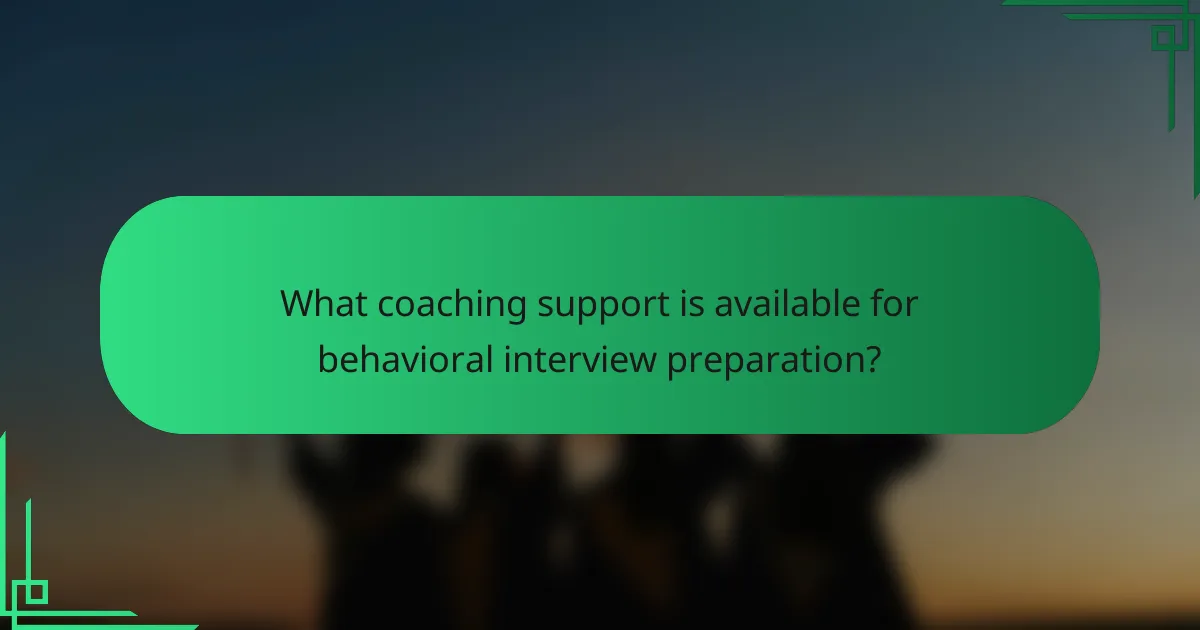
What coaching support is available for behavioral interview preparation?
Coaching support for behavioral interview preparation includes personalized guidance and group learning opportunities. These resources help candidates develop effective strategies to articulate their experiences and demonstrate their skills during interviews.
One-on-one coaching sessions
One-on-one coaching sessions provide tailored support to address individual needs and concerns. A coach can help you identify your strengths and weaknesses, refine your responses to common behavioral questions, and practice your delivery in a safe environment.
During these sessions, you can receive direct feedback on your answers, which can significantly enhance your confidence and performance. Consider scheduling multiple sessions leading up to your interview to allow for continuous improvement and adjustment.
Group workshops and seminars
Group workshops and seminars offer a collaborative environment for learning and practicing behavioral interview techniques. These sessions typically involve role-playing exercises, where participants can practice answering questions in front of peers and receive constructive feedback.
Participating in a group setting can also expose you to a variety of perspectives and strategies that you might not have considered. Look for workshops that focus on specific industries or job roles to ensure the content is relevant to your career goals.
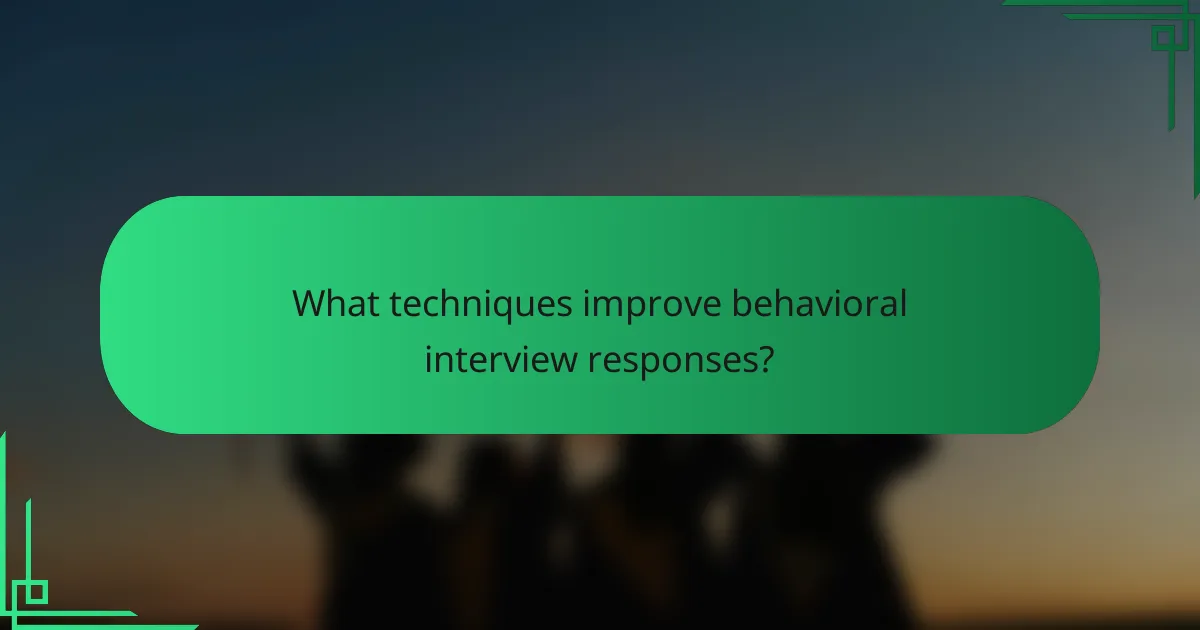
What techniques improve behavioral interview responses?
Improving behavioral interview responses involves using structured techniques and enhancing communication skills. Key methods include the STAR method for organizing answers and employing active listening along with effective body language.
STAR method for structuring answers
The STAR method stands for Situation, Task, Action, and Result. This framework helps candidates provide clear and concise responses by outlining a specific scenario, the task at hand, the actions taken, and the outcomes achieved.
When using the STAR method, focus on relevant experiences that showcase your skills. For example, instead of a vague description, detail a specific project where you led a team (Situation), your role in the project (Task), the steps you took to address challenges (Action), and the positive impact on the team or organization (Result).
Active listening and body language tips
Active listening is crucial during a behavioral interview as it demonstrates engagement and respect. Show that you are listening by nodding, maintaining eye contact, and occasionally paraphrasing the interviewer’s questions to confirm understanding.
Body language also plays a significant role in communication. Stand or sit up straight, avoid crossing your arms, and use hand gestures to emphasize points. These non-verbal cues can convey confidence and openness, making your responses more impactful.
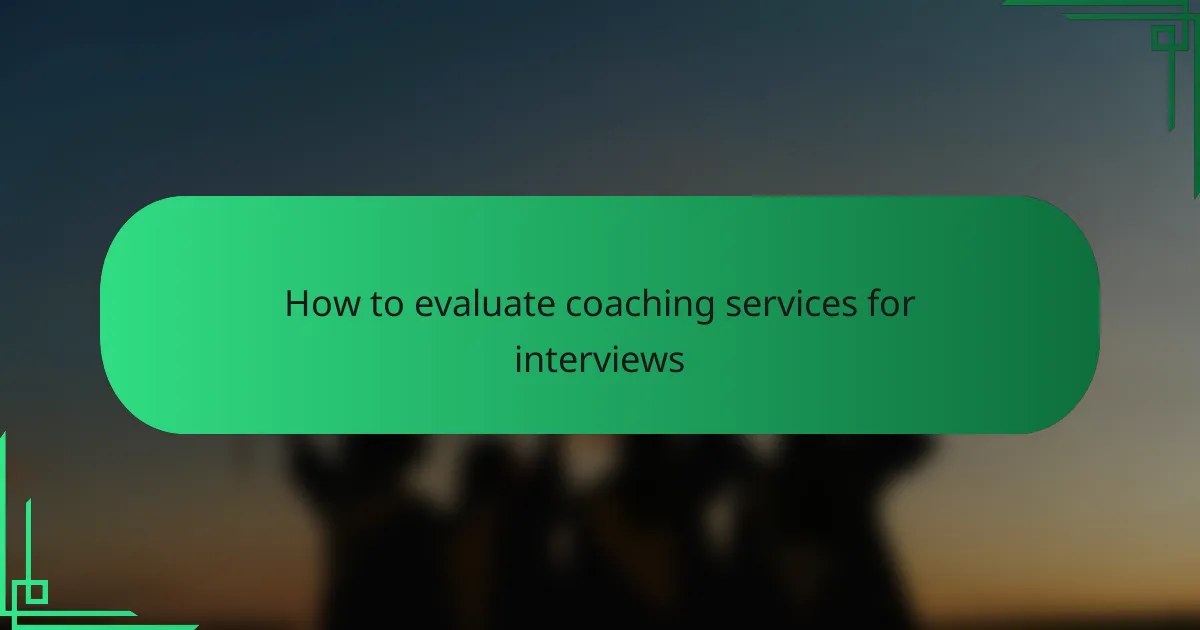
How to evaluate coaching services for interviews
To evaluate coaching services for interviews, focus on the coach’s qualifications, experience, and client feedback. These factors will help you determine the effectiveness and suitability of their coaching approach for your specific needs.
Check credentials and experience
Start by verifying the coach’s educational background and professional certifications. Look for credentials from recognized organizations in career coaching or human resources, as these can indicate a solid foundation in interview techniques.
Experience is equally important; seek coaches who have worked with clients in your industry or have a proven track record of helping candidates secure job offers. A coach with several years of experience may provide insights that newer coaches might lack.
Read client testimonials and reviews
Client testimonials and reviews can provide valuable insights into a coach’s effectiveness. Look for feedback on platforms like LinkedIn or coaching websites, where past clients share their experiences and outcomes after working with the coach.
Pay attention to specific comments regarding the coach’s approach, communication style, and the results achieved. A coach with consistently positive reviews and success stories is likely to be a good choice for your interview preparation.
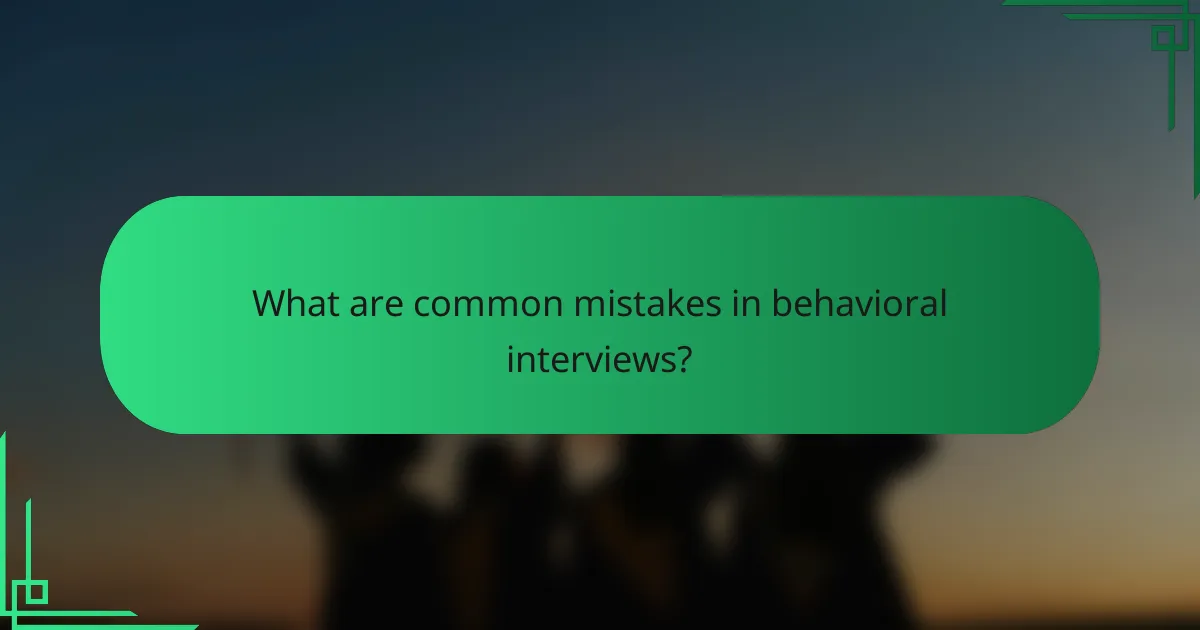
What are common mistakes in behavioral interviews?
Common mistakes in behavioral interviews include failing to provide specific examples and relying on overly rehearsed responses. These pitfalls can hinder a candidate’s ability to effectively showcase their skills and experiences, ultimately affecting their chances of success.
Failing to provide specific examples
One major mistake candidates make is not offering concrete examples when discussing their past experiences. Interviewers look for real-life situations that demonstrate problem-solving skills, teamwork, and leadership. Without specific anecdotes, responses can come off as vague or insincere.
To avoid this mistake, candidates should prepare a few key stories that highlight their accomplishments and challenges. Using the STAR method (Situation, Task, Action, Result) can help structure these examples effectively. For instance, instead of saying “I worked well in a team,” a candidate could say, “In my last project, I collaborated with a team of five to launch a new product, which increased sales by 20% within three months.”
Overly rehearsed responses
Another common error is delivering responses that sound too rehearsed or scripted. While preparation is essential, sounding robotic can make it difficult for interviewers to connect with candidates. Authenticity is key in behavioral interviews, as interviewers want to gauge genuine reactions and thought processes.
To strike a balance, candidates should practice their stories but remain flexible in their delivery. Engaging in mock interviews with a coach can help refine responses while maintaining a natural conversational tone. Additionally, candidates should be ready to adapt their examples based on the specific questions asked, ensuring they remain relevant and relatable.
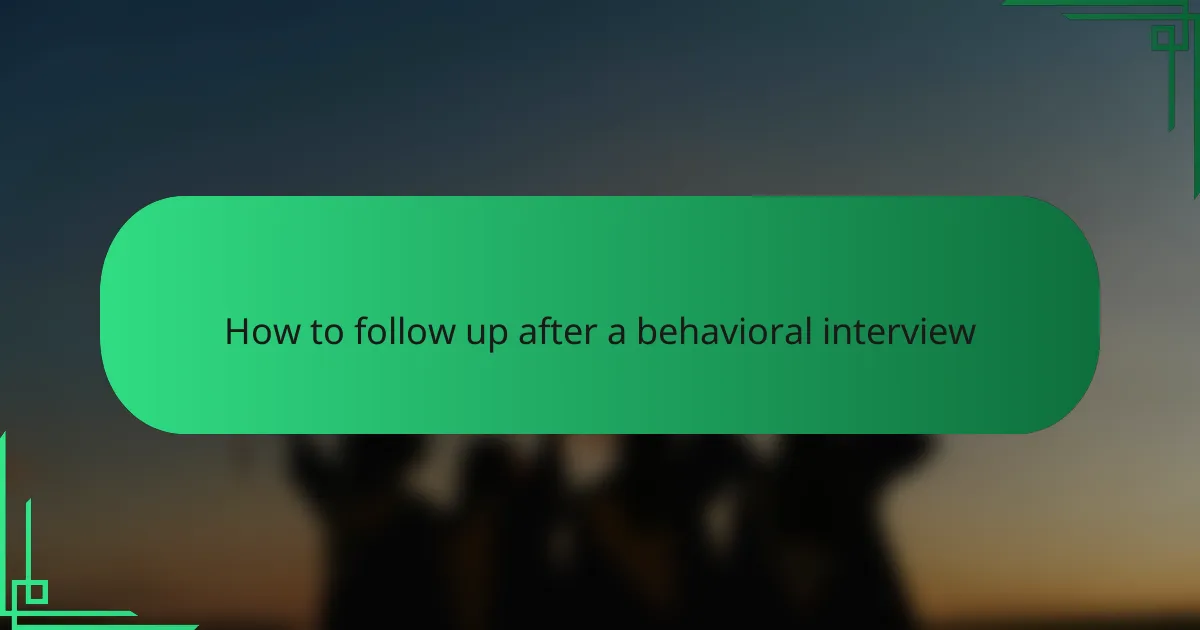
How to follow up after a behavioral interview
Following up after a behavioral interview is essential for reinforcing your interest in the position and leaving a positive impression. A well-timed follow-up can help you stand out among other candidates and may even provide valuable insights into your interview performance.
Send a thank-you email
Sending a thank-you email within 24 hours of your interview is a crucial step. This email should express gratitude for the opportunity, reiterate your interest in the role, and briefly highlight how your skills align with the company’s needs. Keep it concise, ideally no longer than a few short paragraphs.
In your email, personalize it by mentioning specific topics discussed during the interview. This shows attentiveness and reinforces your fit for the position. Aim for a friendly yet professional tone, and ensure you proofread for any errors before sending.
Request feedback on performance
After sending your thank-you email, consider asking for feedback on your interview performance. This request can provide you with insights into your strengths and areas for improvement, which is valuable for future interviews. Frame your request politely, expressing that you appreciate any constructive criticism they can offer.
When requesting feedback, be specific about what aspects you would like to know more about, such as your answers to behavioral questions or your overall presentation. Keep in mind that not all employers will provide feedback, but those who do can offer guidance that may enhance your interviewing skills moving forward.

What emerging trends are shaping behavioral interview coaching?
Emerging trends in behavioral interview coaching focus on integrating technology, enhancing personalization, and adapting to evolving workplace dynamics. These trends aim to improve candidates’ preparedness and confidence, making them more competitive in the job market.
Incorporation of AI in interview preparation
The incorporation of AI in interview preparation is revolutionizing how candidates approach behavioral interviews. AI tools can analyze responses, provide instant feedback, and simulate interview scenarios, allowing candidates to practice in a realistic environment.
For example, AI-driven platforms can assess a candidate’s tone, body language, and content, offering tailored suggestions for improvement. This technology can help candidates refine their storytelling techniques and highlight relevant experiences effectively.
When using AI for interview preparation, candidates should ensure they engage with multiple platforms to gain diverse insights. They should also be cautious of over-reliance on technology, as personal reflection and human feedback remain crucial for successful preparation.
